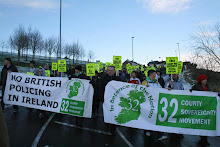
The Source Of Our Conflict Predates Partition
Francie Mackey, chairman 32CSM Omagh, Co Tyrone
Letter Irish News.
13/10/09
Bernard Mulholland (September 30) provides a welcome entry into the debate over the existence of the six counties and Irish national sovereignty.
That ‘existence’ is at the heart of the conflict.
The right or not of the six counties to exist cannot be excluded from determining its future.
Political arrangements which presume its right to exist are merely attempts to retrospectively right a committed wrong.
The 32 County Sovereignty Movement (32CSM) made this point in our United Nations submission where we sought, and still seek, a UN ruling that the continued British presence in Ireland is in breach of international law.
The grave flaw in the peace process was British insistence that its claim to sovereignty over Irish territory was not up for negotiation – acceptance of partition was an entry fee into the talks process.
The British did not reciprocate for Dublin’s removal of articles 2&3. The process was to have a predetermined outcome, namely, partition would remain.
Saying now that that outcome can only be changed by an electoral process geared toward protecting the status quo in no way democratises it.
Like our submission to unionism, we also sought engagement with the British government to address their so-called claim of neutrality over the future of the partitioned entity.
All these documents are available on our website and should be viewed collectively.
The 32CSM’s approach to the conflict has been a pragmatic one. Having identified sovereignty as the central issue we sought international arbitration to bring its violation to an end.
Bernard makes the point that ‘Northern Ireland has been in existence for longer than the Irish Republic’ but fails to mention that for the entirety of that existence it has been a theatre of conflict.
The source of conflict predates partition as partition is but another facet of it.
Let’s not forget the pre-partition suppression of the Irish Republic democratically ratified in the 1918 general election.
I would agree wholeheartedly on his ideas concerning international bodies and academic conferences addressing the problems we face but they must address those problems as a means to resolving them and not, like the Good Friday Agreement as a means to justify the constitutional arrangement which gave rise to them.
Certainly it is preferable to resolve conflicts via the ballot box but Bernard must remember that the British government are not democratically accountable to any Irish constituency yet claim the right to deploy its army on Irish streets to defend its illegal sovereign claim.
Irish republicans have not been remiss in recognising, and addressing, unionist concerns.
For our part the 32CSM has sought engagement to address the issue
of Irish national sovereignty and the constitutional future of the Irish people.
Our comrades in Republican Sinn Fein have long championed the Eire Nua policy which represents a radical approach to governance and democracy on the island.
Our door remains open.





No comments:
Post a Comment